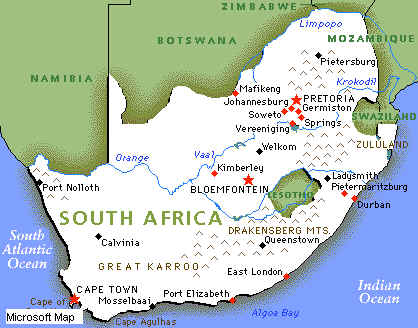


I am five hundred pages into The Covenant, James Michener's historical epic novel about South Africa. Strangely enough his book has got me thinking a lot about biblical hermeneutics. Maybe it's not so very strange because in Michener's portrayal, among the Dutch settlers in what would become South Africa there is the almost universal belief that they are the new Israel in the new promised land. The Dutch loved the Old Testament and believed that like Israel was given the land of Canaan to be her possession, so were the Dutch given land in the African continent. The Dutch consulted the Old Testament earnestly to decipher how they must behave in this new land. On one occasion in the novel they are perplexed whether to baptize a child born of a Malayan slave mother and Dutch father and the cleric at first flatly refuses, but upon finding the passage that Abraham circumcised all in his household including slaves, they see what must be done and further see that the baptism must be performed the selfsame-day since Abraham circumcised his household the same day he was commanded. On another occasion, a devout Dutch woman argues that the old Hottentot servant who has always been around the kitchen while her mother-in-law is cooking meals, must no longer be in the house because he is one of the children of Ham, who are cursed by God, and no Canaanite should be in the house of the Lord. Intermarriage and intermingling of the races, though it is done especially in the early days when white women are scarce, is viewed as sinful like the Israelite intermarriage with the pagan peoples which was explicitly forbidden by God. The enemies of the Dutch, the cattle-stealing Bushmen and the Xhosa, the black tribe who are moving west as the Dutch are moving east and so competing for the same land, are like the enemies of Israel and it is argued at one point by a character in the novel that just as in biblical times five of God's people will put a hundred enemies to flight. With the superior weapons of the Dutch, this estimate turns out to be sadly true in their skirmishes and battles.
With an almost exclusive focus on the Old Testament, the Dutch pursue parallels between the nation of Israel in the promised land and the Dutch in Africa and Jesus' words in the Great Commission are heeded less than God's commands to Israel to be a separate holy people. I suppose their firm belief in the doctrine of predestination, the same belief that lead some of them to be certain that they personally were of the elect and most of them being sure that most of the Dutch nation were of the elect, rendered evangelism rather superfluous. Some may have assumed very few of the African tribes were of the elect, working on the demented theory of the children of Ham, and if people are predestined to be elect or reprobate, then they will be saved or damned somehow without the necessity of strenuous effort on anyone's part. At least, if you are a firm believer in predestination, you can never preach to any individual that Jesus died for them, because you don't know if they are elect or reprobate. In Michener's novel, although the strengths of the Dutch people are evident and as a whole they seem to be courageous and God-fearing salt-of-the-earth type people, many times I felt ashamed of my ancestry as I read of their dealings with the Bushmen or Xhosa or when I read of their questionable biblical interpretation. These stubborn Calvinists are of the same stock that I was descended from. While the Dutch seem to ignore the Great Commission, Hilary Saltwood, an English missionary, desires to fulfill it, working with the slaves and servants of the Dutch and the Xhosa. In his training at the London Missionary Society, the New Testament was emphasized with very little mention of the Old Testament. The Dutch settlers point him to Joshua and Deuteronomy, solemnly reading him passages out of their big family Bibles, and he studies more of the Old Testament, but remains steadily New Testament in his theology and ethics.
I think if you had to pick either the Old or New Testament to focus on exclusively, the New Testament is a better choice. However it is best to take the whole of the Bible. Without the Old Testament Scripture loses much of its richness. To see how Christ is the fulfillment of the law and how everything the Old Testament points to Christ, as the resurrected Lord showed to two men on the road to Emmanous, is an extraordinary thing. To track the progression of revelation, to read of creation and the Fall and God's promises, to read the stories God's dealings with the patriarchs, of God's deliverance in the Exodus, to hear the honest prayers of God's people in the psalms, to read the calls to repentance and words of hope in the prophets--these all are things I would not want to miss. The stories of Israel's sin and failure to follow the stipulations of their covenant with God, the cycle of sin during the times of the judges and the many evil kings in Israel's history, show clearly why a Saviour was needed, God's Son, the Word made flesh who would be the Passover lamb. God's faithfulness to his covenant is shown against a background of Israel's faithlessness and the need for a new better covenant is made obvious.
I guess those who focus solely on the New Testament still have a general knowledge of the stories of the Old Testament, but I still think they miss out on a lot. However to ignore the New Testament is to miss out on a lot more. If I lived in that time, I don't know if I would have done better than the Dutch in South Africa. Would I have gone against the flow of the general consensus? I don't know, but I suspect not. Now it seems so obviously wrong to view your people as the new Israel, when that time in salvation history is past and the Saviour has come, the descendent of Abraham and Jacob and David. Ofcourse it is true that the church is the new Israel, but its inheritance is not a physical piece of land. The real enemy is no longer flesh and blood and the word of God must be preached to all nations in fulfillment of the Great Commission. In the end, I suspect the Dutch record in South Africa was as flawed as that of Israel in the land of Canaan, though for different reasons. Nevertheless, like in the biblical story, redemption and reconciliation always is possible, or, at least, is possible until the return of the Redeemer.
3 comments:
Very insightful Suzanne. I think I'll pick up a copy of The Covenant and give it a read myself. Although I'm not Dutch - I'm sure I'll get a lot out of it.
Yes I think you would. The history of South Africa is fascinating and James Michener excells at writing historical fiction. My Dad has an extensive James Michener collection, but this is the first Michener I have read other than a couple of chapters of "The Source." I am starting to sympathize more with the Boers, although I don't agree with many of their actions and attitudes, and much of their biblical interpretation. The Covenant is more than 1000 pages in length, but is very readable and it enlivens my solitary one-hour lunch breaks considerably.
Great book, one of my favourites.
Post a Comment